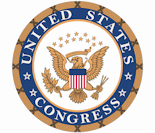Congressional Investigation
 One of the most important nonlegislative functions of the Congress is the power to investigate. This power is usually delegated to committees—either to the standing committees, to special committees set up for a specific purpose, or to joint committees composed of members of both houses.
One of the most important nonlegislative functions of the Congress is the power to investigate. This power is usually delegated to committees—either to the standing committees, to special committees set up for a specific purpose, or to joint committees composed of members of both houses.
Dictionaries define “oversight” as “watchful care,” and this approach has proven to be one of the most effective techniques that Congress has adopted to influence the executive branch. Congressional oversight prevents waste and fraud; protects civil liberties and individual rights; ensures executive compliance with the law; gathers information for making laws and educating the public; and evaluates executive performance. It applies to cabinet departments, executive agencies, regulatory commissions, and the presidency.
Investigations are conducted to gather information on the need for future legislation, to test the effectiveness of laws already passed, to inquire into the qualifications and performance of members and officials of the other branches, and, on rare occasions, to lay the groundwork for impeachment proceedings. Frequently, committees call on outside experts to assist in conducting investigative hearings and to make detailed studies of issues.
There are important corollaries to the investigative power. One is the power to publicize investigations and their results. Most committee hearings are open to the public and are widely reported in the mass media. Congressional investigations thus represent one important tool available to lawmakers to inform the citizenry and arouse public interest in national issues. Congressional committees also have the power to compel testimony from unwilling witnesses and to cite for contempt of Congress witnesses who refuse to testify and for perjury those who give false testimony.
The oversight power of Congress has helped to force officials out of office, change policies, and provide new statutory controls over the executive. In 1949, for example, probes by special Senate investigating subcommittees revealed corruption among high officials in the Truman administration. This resulted in the reorganization of certain agencies and the formation of a special White House commission to study corruption in the government. The Senate Foreign Relations Committee’s televised hearings in the late 1960s helped to mobilize opposition to the Vietnam War.
Congress’s 1973 Watergate investigation exposed White House officials who illegally used their positions for political advantage, and the House Judiciary Committee’s impeachment proceedings against President Richard Nixon the following year ended his presidency. Select committee inquiries in 1975 and 1976 identified serious abuses by intelligence agencies and initiated new legislation to control certain intelligence activities.
|
NEWSLETTER
|
| Join the GlobalSecurity.org mailing list |
|
|
|

